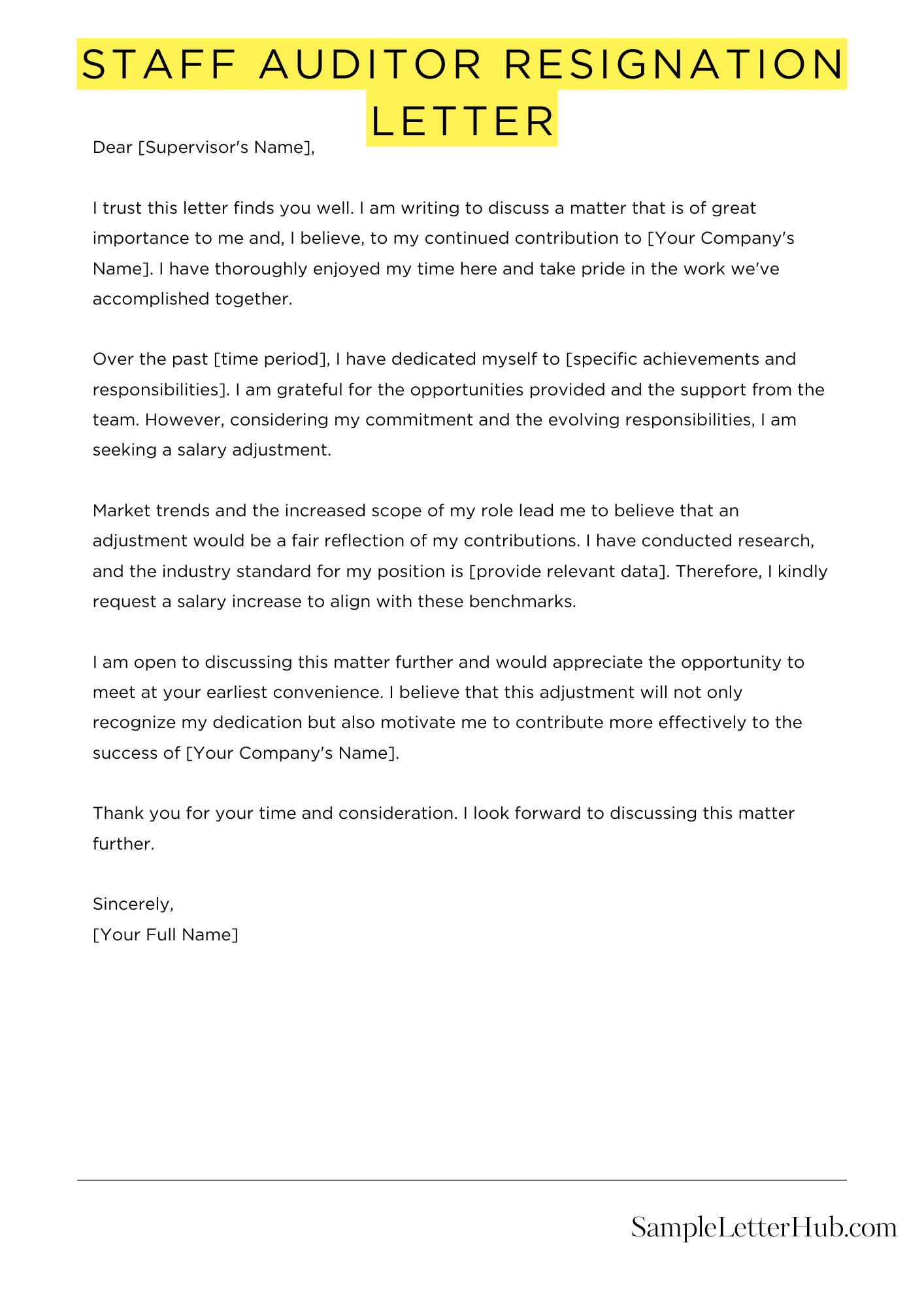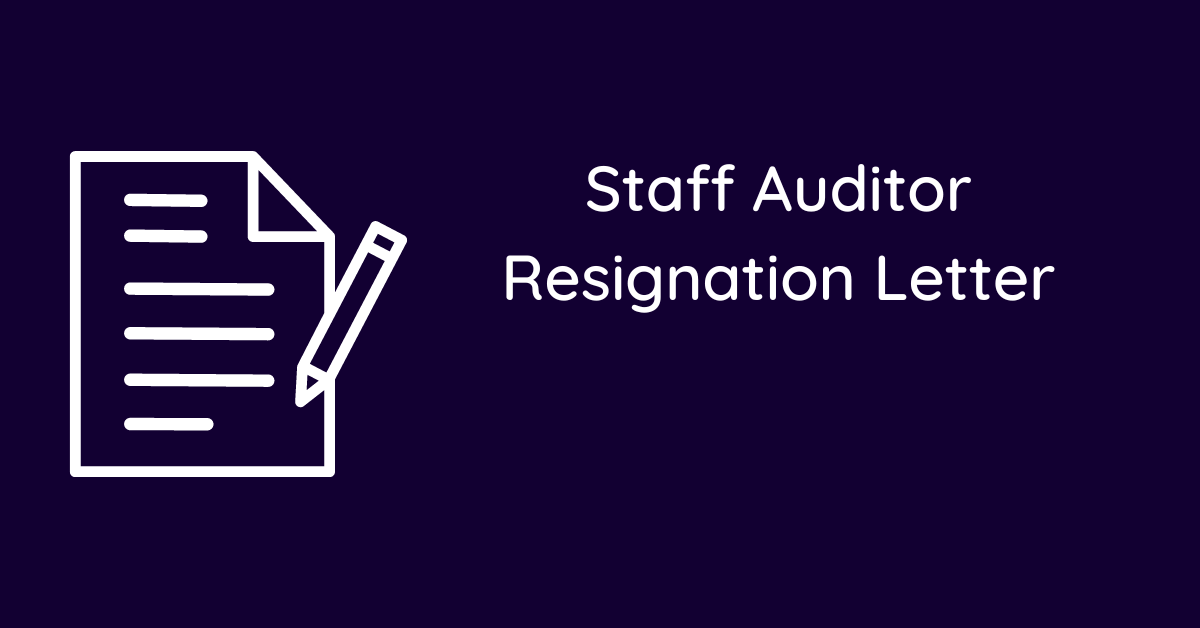Thinking about writing a staff auditor resignation letter? You’re in the right place. In this article, we’ll share an example of a staff auditor resignation letter with you.
One way to leave a job is to write a clear and professional resignation letter explaining your decision to leave. It’s important to be polite and humble in the letter’s tone. You want to leave a good impression on your employer, even if you’re not happy with the job.
Below, we’ve shared a template/example staff auditor resignation letter that you can use. Feel free to adapt it to your own needs.
Staff Auditor Resignation Letter
Dear [Recipient Name],
Please accept this letter as formal notification that I will be resigning from my position as Staff Auditor at [Company Name], effective [Last Date of Employment].
I have enjoyed my time at [Company Name] and am grateful for the opportunities and experiences I have gained during my tenure. I have learned a great deal and have developed valuable skills that I will carry with me in my future endeavors.
I would like to express my sincere appreciation for your guidance and support throughout my time here. I wish you and [Company Name] all the best in the future.
Sincerely,
[Your Signature]
Short Staff Auditor Resignation Letter Sample
Please accept this letter as formal notification that I am resigning from my position as Staff Auditor at [Company Name]. My last day of employment will be [Your Last Day]. Thank you for the opportunity to grow and learn during my time here. I wish you and the company continued success. I am happy to assist in the transition process to ensure a smooth handover of my responsibilities.
I wish you all the best with your staff auditor resignation letter.
When it’s time to say farewell, expressing your gratitude and best wishes can make the transition smoother:

How to Write a Staff Auditor Resignation Letter
When it comes to leaving a job, writing a resignation letter is an essential step. For staff auditors, crafting a well-written resignation letter is crucial for maintaining professional relationships and ensuring a smooth transition. Here’s a comprehensive guide to help you write an effective staff auditor resignation letter:
1. Start with a Formal Introduction
Begin your letter with a formal salutation, such as “Dear [Manager’s Name].” Clearly state your intention to resign from your position as a staff auditor and provide your last date of employment.
2. Express Gratitude and Appreciation
Take this opportunity to express your gratitude for the opportunities and experiences you’ve gained during your time at the company. Highlight specific projects or accomplishments that you’re proud of and thank your manager for their support and guidance.
3. State Your Reasons for Leaving
While it’s not necessary to go into excessive detail, briefly mention your reasons for leaving. Whether you’re pursuing a new opportunity, seeking more challenges, or relocating, be honest and professional in your explanation.
4. Offer to Assist with the Transition
Demonstrate your commitment to a smooth transition by offering to assist with training your replacement or completing any outstanding projects. This shows that you’re invested in the company’s success even as you move on.
5. End with a Positive Note
Conclude your letter with a positive and professional tone. Express your well wishes for the company’s future and reiterate your appreciation for the experience. Use a closing salutation, such as “Sincerely,” followed by your typed name.
6 Most Frequently Asked Questions About Staff Auditor Resignation Letters
When it comes to writing a staff auditor resignation letter, there are a few key questions that often come up. Here are the six most frequently asked questions, along with their answers:
1. What is the proper format for a staff auditor resignation letter?
A staff auditor resignation letter should be formal and concise. It should include your name, address, date, the name of the company you are resigning from, and the date your resignation will be effective. You should also state your reason for resigning and express your gratitude for the opportunity to work at the company.
2. What should I include in my reason for resigning?
Your reason for resigning can be brief and to the point. You do not need to go into great detail, but you should be honest and professional. Some common reasons for resigning include:
- Accepting a new position
- Pursuing further education
- Relocating
- Starting a family
- Changing careers
3. What if I don’t have a new job lined up?
It is not necessary to have a new job lined up before you resign from your current position. However, it is a good idea to have a plan in place for what you will do next. You may want to start networking with other professionals in your field or start looking for new job openings.
4. How much notice should I give?
The amount of notice you should give will vary depending on your company’s policy. However, it is generally considered good practice to give at least two weeks’ notice. This will give your employer time to find a replacement for you.
5. What should I do if my employer asks me to stay?
If your employer asks you to stay, it is important to be polite and professional. You should thank them for their offer and explain that you have already made up your mind to resign. You can also offer to help with the transition process in any way that you can.
6. What are some tips for writing a strong resignation letter?
Here are a few tips for writing a strong resignation letter:
- Keep it brief and to the point.
- Be formal and professional.
- State your reason for resigning.
- Express your gratitude for the opportunity to work at the company.
- Offer to help with the transition process.
Before making the decision to resign from your job, it’s essential to consider the legal aspects:
Understanding your emotions after quitting your job is important. Explore why you might be feeling sad:
Related
- Resignation letter sample
- Forced resignation letter
- Resignation letter due to going abroad
- Resignation letter due to marriage
- Resignation letter due to other opportunity
- Resignation letter due to mistake

